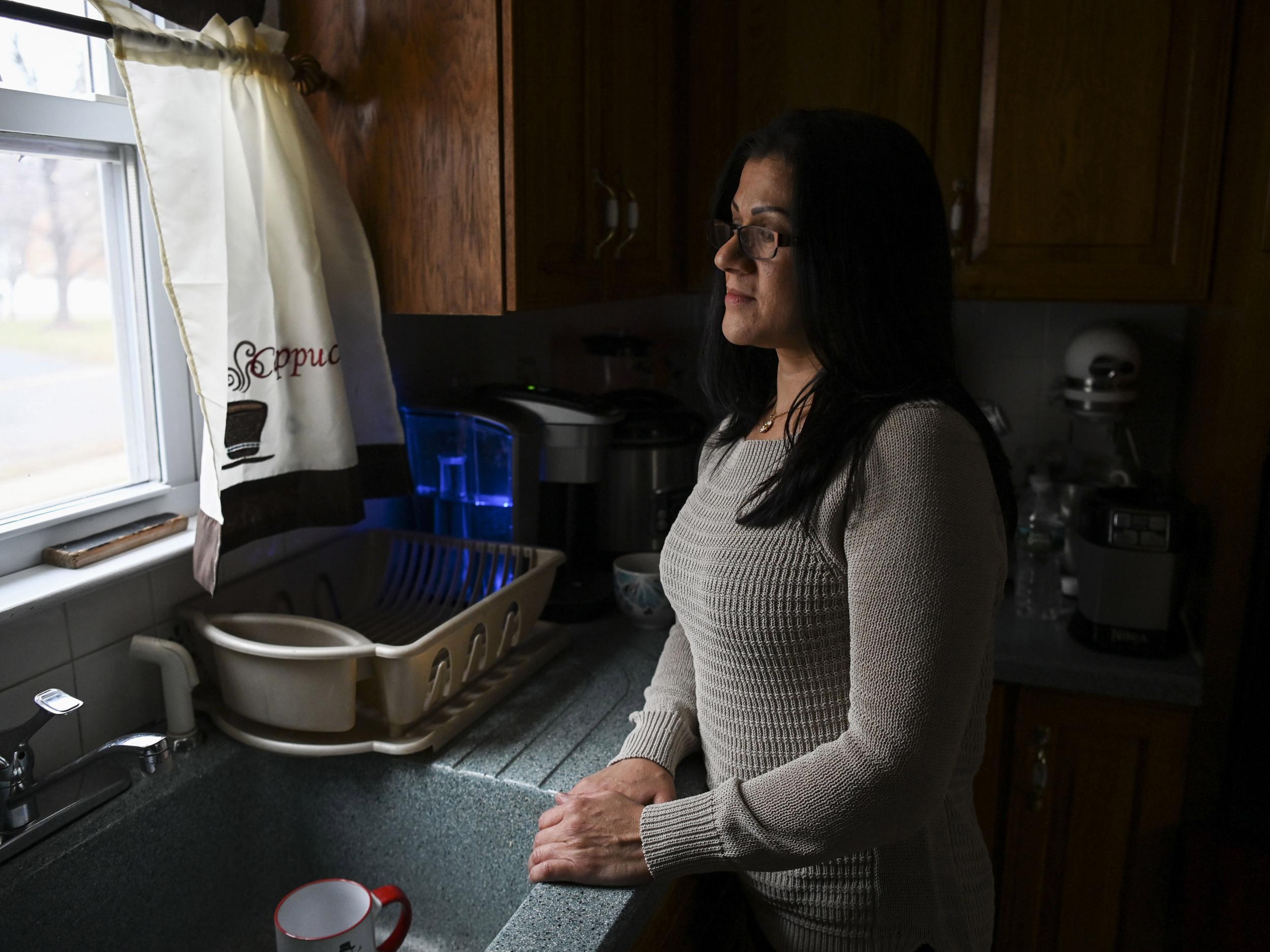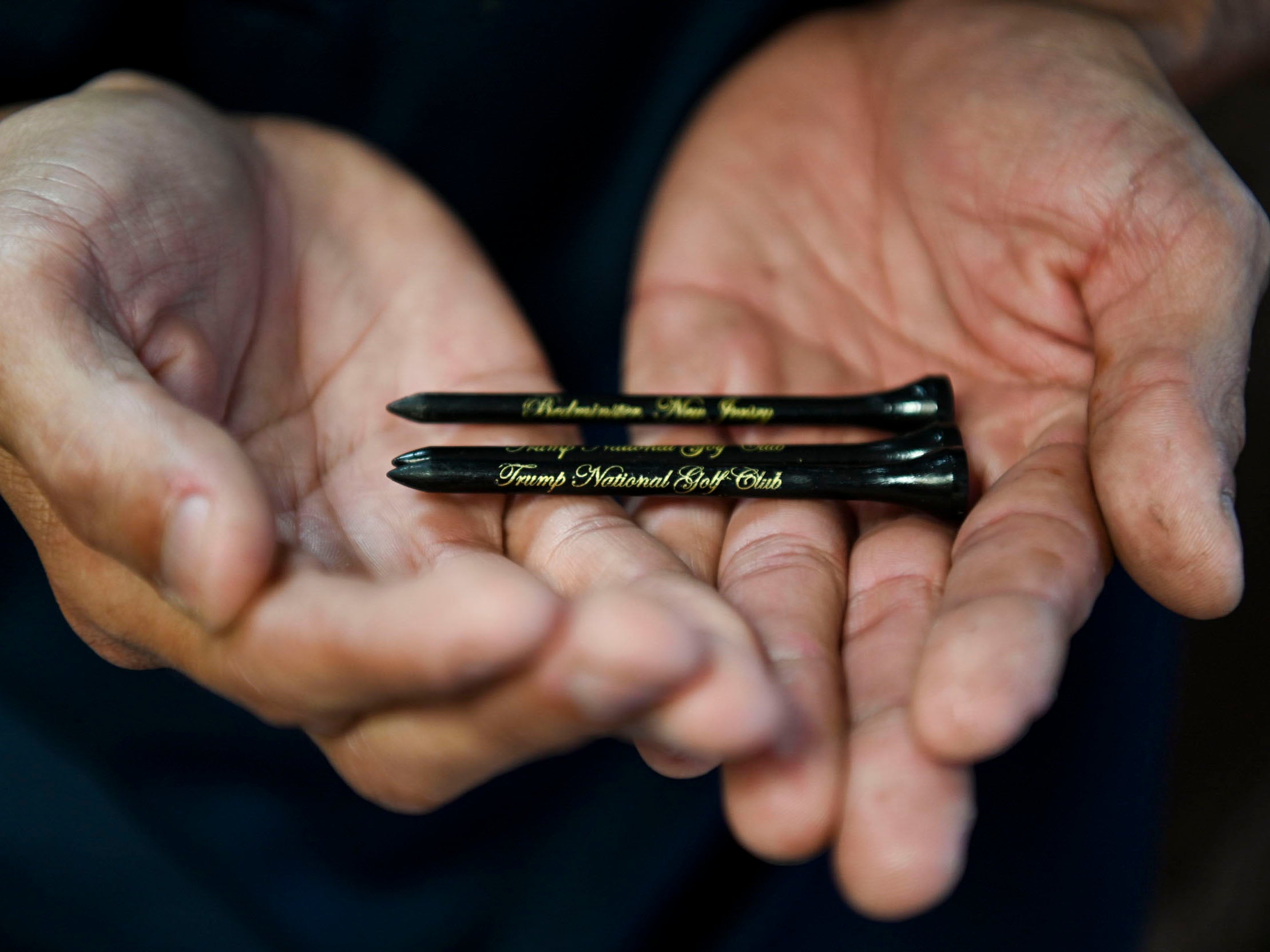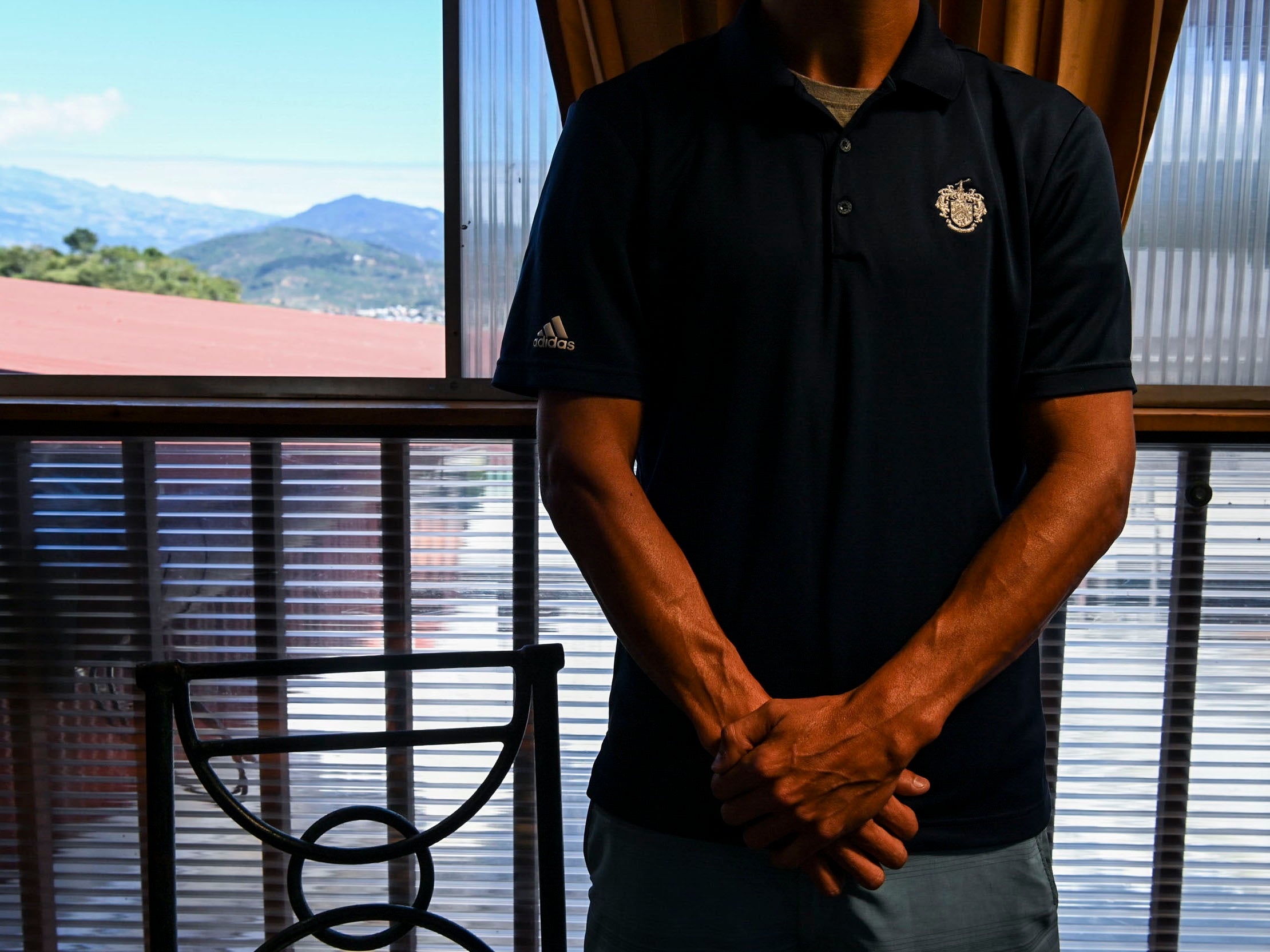How two housekeepers took on Trump and revealed a network of undocumented immigrants in his company
Following his hypocritical language towards illegal immigrants, the same ones he employed, Sandra Diaz and Victorina Morales decided it was time to come forward, write Joshua Partlow and David A Fahrenthold

It was important for Sandra Diaz to be invisible.
Before entering the Trump family villa, she would tie back her hair, pull on latex gloves and step into delicate paper shoe coverings. She knew not to wear makeup or perfume that might leave the faintest trace of her presence.
As Donald Trump’s personal maid, Diaz was dealing with a fussy celebrity owner who presided like a monarch over the Trump National Golf Club Bedminster long before he was elevated to president. She was an immigrant from Costa Rica working illegally for Trump with a fake social security card she had bought for $50 (£38). Being invisible was her life’s work.
Moving quickly through the two-storey house in the mornings, Diaz carried out Trump’s fastidious instructions. In his closet, she would hang six sets of identical golf outfits: six white polo shirts, six pairs of beige pants, six neatly ironed pairs of boxer shorts. She would smear a dollop of Trump’s liquid face makeup on the back of her hand to make sure it hadn’t dried out.
The years of service that Diaz and other undocumented immigrant housekeepers, cooks, landscapers, greenskeepers, waiters, bellhops, farmhands and caddies devoted to the Trump Organisation have given them a remarkable vantage point into the unvarnished lives of the now-first family. They have seen poolside tantrums and holiday arguments. They’ve laughed with the in-laws and watched after the grandchildren.
Their recollections also show how Trump’s entrance into presidential politics – denouncing illegal immigrants as criminals and job-stealers – upended their lives and prompted some of them to publicly confront their former boss.
Over the past year, The Washington Post has spoken with 48 people who had worked illegally for the Trump Organisation at 11 of its properties in Florida, New Jersey, New York and Virginia. These workers spent years – and in some cases nearly two decades – performing the manual labour that keeps Trump’s resorts clean and their visitors fed.
This story is based on interviews with these workers, many of whom were fired or walked away from their jobs after media reports about their employment.
The Post verified workers’ employment histories by reviewing payslips and tax documents and, when possible, corroborating accounts with their colleagues. The workers uniformly contend that their managers were aware of their undocumented status, a topic they said came up during conversations and workplace disputes.
Trump, who still owns the Trump Organisation but has left day-to-day control to his eldest sons, has said he does not know whether it employs undocumented workers.
“Well, that I don’t know. Because I don’t run it,” he told reporters in July. “But I would say this: Probably every club in the United States has that, because it seems to me, from what I understand, a way that people did business.”

The Post sent White House press secretary Stephanie Grisham a list of the anecdotes that former undocumented employees told about the Trumps’ private quarters at Bedminster and his in-laws.
“The assertions made for this story are not only false, they are a disgusting attempt at invading the privacy of the first family,” Grisham wrote in response. “This is not journalism – it is fabricated tabloid trash.”
Grisham did not specify which details were inaccurate. She also declined to answer questions about Trump’s longtime employment of undocumented workers and how it squares with his rhetoric about illegal immigration.
The Trump Organisation did not respond to requests for comment.
For decades, and well into Trump’s presidency, undocumented immigrants lived as Trump’s shadow family – ever present, if rarely considered. Trump had met many of them. There were three questions nearly every immigrant who worked for him was asked as Trump strolled the grounds of his resorts and golf clubs inspecting their work. “Your name. How much time you’d been there. And if you like it,” said Margarita Cruz, a housekeeper. This banter often ended with Trump pulling out $50 or $100 bills for tips.
This transactional relationship of discreet service for long hours and often low pay began to evolve as Trump entered politics on the promise to keep out the upward-striving immigrant workers who crumbed his table and scoured his toilets. When Trump referred to some Mexican immigrants as criminals and rapists, when he vowed to wall off the US-Mexico border to prevent an immigrant “invasion”, the worry and anger began to build in the kitchens and laundry rooms of his properties.
Trump’s undocumented workers were forced to smile at stomach-churning comments from wealthy members once he became president. “You’re still here? How come we can’t get rid of you? I’m going to call Trump, you [expletive] Mexican,” Gabriel Juarez, who had been head waiter for a decade at one of Trump’s New York golf clubs, said a member told him jokingly.
‘You’re still here? How come we can’t get rid of you? I’m going to call Trump, you [expletive] Mexican’
It fell to them to scrub off the anti-Trump graffiti scrawled across the mirrors in the men’s locker room at Bedminster one day, and grit their teeth through pep talks by supervisors who they said echoed the boss’s stump speeches: “Now don’t forget, let’s make Mar-a-Lago great again.”
So one day, Diaz, along with Victorina Morales, her successor as Trump’s housekeeper at Bedminster, decided to be seen.
When they spoke in articles in The Post, The New York Times and other publications at the beginning last December, it was not for money – as some of their shocked and frightened colleagues assumed – or really for politics, they say, but to highlight what they consider a glaring hypocrisy.
Trump, despite his rhetoric, had long employed undocumented immigrants, and they were the living proof.
A year later, Diaz and Morales no longer work for Trump. No one is known to have been deported because of the women’s actions, and there is no evidence of legal repercussions for Trump or his company. But the two have endured the anger of friends and colleagues who say they have betrayed a code of silence that permeates the nation’s underground economy.
They say it was worth it.
“How can you know something so big, how someone – who goes on national television and says something – and you know it’s not true,” Diaz explains. “Whether it’s the president or not, you have the responsibility to say no. To pass through this barrier of fear and say no.”
Whether it’s the president or not, you have the responsibility to say no. To pass through this barrier of fear and say no
***
Trump and his family spent so much time at their properties – and still do – that many Trump Organisation employees have stories about encounters with them. But the undocumented workers were often left to perform the most intimate and personal work. Those who cooked and served Trump knew that he liked his cheeseburgers well done and his Diet Coke in small glass bottles with a plastic straw that no one could be seen touching.
Trump loved Tic Tacs. But not an arbitrary amount. He wanted, in his bedroom bureau at all times, two full containers of white Tic Tacs and one container that was half full. The same rule applied to the Bronx Colours-brand face makeup from Switzerland that Trump slathered on – two full containers, one half full – even if it meant the housekeepers had to regularly bring new shirts from the pro shop because of the rust-coloured stains on the collars. A special washing machine in the laundry room was reserved for his wife Melania Trump’s clothing.
Donald Trump liked Irish Spring bar soap in his shower. But his housekeepers quickly learned not to throw out his soap even if it had worn down to the tiniest sliver: Trump decided when he wanted something discarded. When that happened, with clothes or newspapers, he would toss them on the floor.
A regular recipient of Trump’s castoff clothing was Melania’s father, Viktor Knavs, Diaz and Morales said.
“They’re the same size and everything,” Morales says.
Knavs and his wife, Amalija Knavs, were favourites of the Bedminster staff, even if much was lost in translation from Slovenian to Spanish. Amalija Knavs would often cook breakfast in the villa for Melania while Trump regularly ate breakfast in the clubhouse.
One day in 2013, Viktor Knavs went out to play golf wearing one of Trump’s discarded red baseball caps. When Trump spotted him on the fairway, he blew up, and he ordered his father-in-law, in front of other golfers, to remove the hat and get off the course. Diaz and Morales were in the villa when Knavs returned, threw the hat on the ground and cursed Trump.

The housekeepers pieced together the story from what Amalija Knavs told them in English and what they heard from the caddies who were on the course at the time.
“Nobody could wear the red hat but [Trump],” Diaz says. “The whole world saw what Trump had done to his father-in-law,” Morales adds. “[Knavs] was very embarrassed.” The White House did not make the Knavses available for comment.
Even before Trump became commander in chief, his arrival at one of his clubs prompted a flurry of activity. “GG-7” was the code word among employees and security personnel for his arrival at his golf club in Westchester County, New York, after one of his old licence plates. “That means Trump’s coming up,” recalls Gabriel Juarez, the former head waiter. “Everyone was scared. Here comes the boss.”
Trump rarely shied away from his staff. He was particular about every aspect of his clubs’ appearance: from the carpets to the chandeliers to the art on the walls. During his visits, he perpetually scanned for flaws – swiping a finger along a picture frame to check for dust, eyeing the shine on a crystal chandelier.
Gabriel Sedano, an Ecuadoran immigrant on the maintenance staff at Bedminster, recalls hanging portraits – many of Trump – around the club, with Trump at his side. “I carried the paintings,” Sedano says. “He said where he wanted them.”
One day, Morales, 47, stood outside washing the windows of the pro shop at Bedminster. The 4-foot-11-inch Guatemalan woman couldn’t reach the top portion of the window.
“I was jumping and jumping and I saw the guys inside were laughing. I thought, ‘I don’t like that,’” she recalls. Then she sensed something behind her and turned to find Trump. “He took the rag,” she says. “And he started to clean.”
***
On election night in 2016 at Trump International Hotel Washington, a jubilant American chef told Wendy Reyes, an immigrant pastry chef: “We are winning! We are winning!”
Reyes felt dismay. “You’re not going to have that same smile when you come into the restaurant and you see that nobody’s working here because Donald Trump has thrown us all out of the country,” she said she responded.
You’re not going to have that same smile when you come into the restaurant and you see that nobody’s working here because Donald Trump has thrown us all out of the country
For many of Trump’s Latin American employees, this sense of isolation and discomfort grew over time.
The worry among the kitchen staff at BLT Prime, the hotel’s restaurant, was serious enough that a week before Trump took office, undocumented employees met with a manager to say they could not continue to come to work because they didn’t have legal documents and feared deportation.
“There wasn’t any problem,” the manager told them, Reyes says. “He said they had talked to the hotel and everything was going to be fine.”
BLT Prime is not owned by the Trump Organisation, but it operates in conjunction with the hotel. A representative for the restaurant’s ownership group did not respond to a request for comment.
In fact, things got worse.
Trump’s divisive politics seeped into the culture at his resorts and golf courses. Many charities and nonprofit organisations that regularly held events at his properties began to move elsewhere, while conservative groups and causes moved in. When Trump’s family members were on the premises, they now arrived with Secret Service security details and strict new security protocols.
These changes alarmed many undocumented employees. They worried about giving their real names and fake documents to government employees. An undocumented worker on the banquet staff at Mar-a-Lago in Palm Beach, Florida, started skipping events he found overtly political. He considered himself more liberal than the crowd and also anxious about the growing focus on illegal immigration.
“I didn’t feel comfortable working over there. That atmosphere. A lot of conservative people talking about abortion or gay marriage,” says the former employee, who spoke on the condition of anonymity because he didn’t want to jeopardise his relationships at the club. “I got kind of tired of all these anti-immigration [events].”
I didn’t feel comfortable working over there. That atmosphere. A lot of conservative people talking about abortion or gay marriage
At Bedminster, politics intruded in bizarre ways. Housekeepers began noticing anti-Trump messaging popping up around the club. Insults were scrawled on the mirrors of the men’s locker room. A desecrated Trump doll was found hanging in a bathroom cubicle used by Trump on a day he was visiting, Morales says. On the first anniversary of Trump’s inauguration, an activist art collective sneaked onto the Bedminster property at night and built a mock graveyard with headstones announcing the death of “decency” and “our future”.
“It made me afraid,” Morales says. “We began to wonder: What if someone comes and puts a bomb in here?”
Morales had witnessed her father being killed in Guatemala when she was a child and had crossed the US border illegally in 1999. She had a job packing disposable nappies at a warehouse in New Jersey before being hired at Trump’s club.
Morales had not considered speaking against Trump, given her precarious status in the United States and her powerful boss. But working conditions had deteriorated, and the way Trump talked about Central Americans made her feel angry and frightened. What would stop him from rounding her and her family up and sending them back to Guatemala?
“This is bad. This is not normal,” Morales remembers thinking. “He is acting this way knowing that we are working for him inside.”
Diaz left her job at Bedminster and became a permanent US resident, after her daughter, a US citizen, petitioned on her behalf. Her husband and son, however, remained undocumented, and Diaz wanted help getting them legal residency. She had seen Anibal Romero, an immigration lawyer, discuss such topics in videos posted on Facebook. In August, she drove to Newark, New Jersey, and walked into Romero’s firm on Ferry Street, between a dental office and an off licence.
Inside, a television played a news report on Trump’s calls to end birthright citizenship.“How incredible is this guy?” Diaz told Romero. “Can you believe I worked for him?”

The conversation turned to Diaz’s years working for Trump and her dozens of undocumented colleagues. She told him she’d been mistreated and lost out on promotions because she didn’t have a valid work permit.
Romero normally handled lower-profile cases involving migrants fighting deportation or seeking asylum. “This isn’t the type of client that walks in on a daily basis,” he recalls. “I knew this would be a big thing.”
Romero suspected that the Trump Organisation routinely employed undocumented workers in violation of federal law. He wanted Diaz, Morales and other undocumented Trump employees who became his clients to be treated as material witnesses in a possible federal crime – a designation that could protect them from being deported.
One of the meetings he arranged was with Thomas Eicher, an assistant New Jersey attorney general and head of the public integrity office. In early November 2018, Morales and Diaz sat for several hours with Eicher and other members of his team, describing their stories and handing over payslips and other evidence of their employment. As the meeting ended, Morales moved to put her fake social security and green cards back in her purse. Eicher said the documentation was staying, the women say.
The New Jersey attorney general’s office declined to comment.
When they got into the hallway, Morales was nearly in tears. “Sandra, what do I do?” she said. She would not get her protected status. And she now had to buy more fake papers to keep working – ones that wouldn’t match the ones in the Trump Organisations’ files.
***
After leaving Bedminster in 2014, Diaz took a job with Val Della Pello, the president of a paving company in New Jersey and a member of the Bedminster club. Diaz became his family’s personal housekeeper.
Diaz had not told Della Pello or his wife that she was planning to speak publicly about Trump.
Diaz went to their house in Bedminster a few days after an article about her appeared in The New York Times last December. Worried about how they might react, she had turned on a recorder on her mobile phone before she walked in the door.
“You told us you were sick on Wednesday and you showed up on Good Morning America,” Della Pello told her. “We’re disappointed, to say the least.”
The Della Pellos did not respond to requests for comment. New Jersey requires only one party of a conversation to consent to a recording. The recording, which Diaz shared with a Post reporter, was an example of the furious reaction some Trump allies had to her decision to go public.
For more than 20 tense minutes, the couple grilled Diaz about her decision to speak out, at times shouting angrily at her.
“What was the purpose? Sandra, in the end, what was the purpose?” Della Pello asked her.
Diaz stood quietly in the couple’s kitchen, she recalls. She was nervous, and she didn’t speak English well. She said it was not just her, that Trump had employed many undocumented workers.
“Nobody is against people coming in from any country provided they do it legally,” Della Pello said, according to the recording. “Because it has gotten out of control, OK? That is a fact. It is out of control.”
“He lied,” Diaz said quietly of Trump. “He lied.”
“Everybody lied!” Della Pello shouted. “But Sandra, everybody lied. Everybody lied. When you cross the border illegally, you lied ... Everybody’s been lying to suit their own personal gain or own personal prosperity one way or the other. Everybody. Everybody has. It’s called politics. So you don’t think the Obamas lie?”
Everybody’s been lying to suit their own personal gain or own personal prosperity one way or the other. Everybody. Everybody has. It’s called politics
For four years, Diaz had felt like a member of the Della Pello family. This was the last time they would see each other. Della Pello did not respond to phone messages left with his company seeking an interview.
Many of Diaz and Morales’s friends and colleagues, a tight-knit community of immigrants in Bound Brook, New Jersey, also turned against them.
“What she is doing is stabbing the others in the back,” a greenskeeper at Bedminster who was from Diaz’s hometown in Costa Rica, texted a group of colleagues after the Times article came out. “What an embarrassment that she is from my barrio.”
Her friends accused her of risking others’ jobs and setting them up to be deported.
“I also worked there a long time without papers but the most incredible thing is to see how people, when they have papers, forget how they got here,” Antonio Zuniga, a former Bedminster greenskeeper, wrote on Facebook. “I’m sorry but people like you Dona Sandra have forgotten their principles.”
Zuniga did not respond to requests for comment. The friends’ fears about repercussions were soon realised.
In January, Trump’s son Eric Trump announced that as a result of news reports about the Trump Organisation’s undocumented workers, the company was “making a broad effort to identify any employee who has given false and fraudulent documents to unlawfully gain employment”, and that any such people would be immediately fired.
The company began auditing the legal status of its employees at its golf courses. A top human resources executive at the company visited golf courses and called workers one by one into meetings, where they learned they were summarily fired.
A precise count of firings is unknown. The Post has confirmed at least 18 firings at five golf courses in New York and New Jersey. At Bedminster, former workers estimate that 30 to 40 more undocumented employees were not asked back this spring.

“Our employees are like family, but when presented with fake documents, an employer has little choice,” Eric Trump told The Post earlier this year.
This year, the Trump Organisation also instituted E-Verify, a voluntary federal programme that allows employers to check the employment eligibility of new hires. Several of the Trump properties had not been enrolled in the programme when the year started, according to the E-Verify database.
The company has not said whether it audited employees’ immigration status before this year.
Undocumented people are known to have worked for the Trump Organisation previously. In 1980, when Trump was just starting out as a developer, he used hundreds of undocumented Polish immigrants to demolish a building on the future site of Trump Tower. Trump said he had no idea about the illegal workers, but – after a lawsuit alleging labour violations – a judge ruled that Trump “should have known”. Trump settled the case for $1.38m in 1998.
***
For some of the workers, the ability to finally be visible has outweighed the fact that there have been significant consequences for many of their colleagues – and few legal repercussions for Trump.
“The only thing we want is to have these rights like every person who lives here,” says Margarita Cruz, who worked for Trump at his Westchester club for eight years. “To have insurance, to have benefits. And more than anything, to remove the fear – that at any moment we could be deported – from our lives.”
Over the past year, many of Trump’s former employees have had difficulty finding new jobs. Some have yet to be rehired; others work part-time or sporadic day labour.
Adela Garcia, who earned about $30,000 a year as a housekeeper at the Westchester club until she was fired in January, now cleans houses in her hometown of Ossining, New York. But only two days a week, for a quarter of the pay. “The rent doesn’t stop,” she says. “You have to keep paying.”
Her husband, Gabriel Sedano, who had spent 14 years at the club on the maintenance staff, was also fired. He went five months without finding a new job. Eventually, a friend helped him get hired at a restaurant. But his new boss had seen him on television speaking about Trump. So the job came with a warning.
“They said, ‘Don’t get us in trouble,’” he recalls. “I said the only thing I want to do is work. I don’t want any problems either.”
Two months after Diaz and Morales first told their stories, Democrats in congress invited the pair to be guests at Trump’s State of the Union address. (“Tolerance for illegal immigration is not compassionate – it is cruel,” Trump said in his speech that day in February.)
When Trump announced his campaign for a second term in June at a rally in Orlando, Florida, Diaz and Morales were there to protest and to remind people of their existence.
“We are here to show our faces not just for ourselves but for the 11 million [undocumented] immigrants who are here in the country,” Morales said at a news conference that day.
We are here to show our faces not just for ourselves but for the 11 million [undocumented] immigrants who are here in the country
This week, Morales and Diaz attended town hall meetings of Democratic presidential candidates over three days in Las Vegas.
Despite repeated calls by Democrats in congress, it is unclear whether the Department of Homeland Security or other agencies are investigating the Trump Organisation’s use of undocumented labour.
The New York State attorney general’s office opened an inquiry and interviewed more than 20 former workers about potential wage violations at the company, but former workers say they have heard nothing in months. An official in the attorney general’s office said last month that the inquiry is ongoing but declined to offer further details.
Jorge Castro, an Ecuadoran immigrant who spent nine years as part of a roving band of stonemasons who built rock walls at several Trump golf courses, filed a complaint in August with the Labour Department. He alleges that the Trump Organisation did not pay him for all the hours he worked.
A Labour Department representative told Romero last month that the department would not be pursuing Castro’s case. Morales has applied for asylum and has been granted a legal work permit while that process plays out.
When Diaz finally spoke out, she felt relief, and a new sense of purpose, to be able to share her experience, but also to stand up for those immigrants whom Trump often disparages.
She became an advocate for other undocumented Trump employees, somebody who could relate to their lives and concerns. Working for Romero’s law firm, she travelled to cities up and down the Eastern Seaboard to meet dozens of her former colleagues at other Trump properties.
At one point this year, she stood in a kitchen in Charlottesville, Virginia, talking to an undocumented immigrant who was still employed at Trump Winery. The worker had spread out years of Trump Organisation payslips, tax documents and health records on a table.
To an outsider, it may have seemed counterintuitive to stockpile all this proof of illegal labour. “Do you know why we save everything, we Hispanics?” Diaz said to a reporter who was watching.
It was the hope that one day there would be amnesty for those who had lived and worked in the United States, regardless of how they had crossed the border.
“We were always told there will be a reform, and we’ll need all our documents as proof,” she said. “Exactly,” the winery worker said.
He was not ready to step forward with his own story. But the example of Diaz and others in Trump’s undocumented labour force had taught him to prepare for a different future. One in which he might be visible to all.
© Washington Post
Join our commenting forum
Join thought-provoking conversations, follow other Independent readers and see their replies
Comments
Bookmark popover
Removed from bookmarks